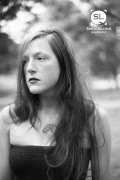You must read a lot of poetry. Who are your favorites?
The first poet I fell for was e. e. cummings. His work made me think about what words themselves are capable of doing in juxtaposition. There’s something architectural in his construction of emotion and sensation or image. More recently, I like James Wright, Yusef Komunkayaa, Kenneth Koch … many others. My friend Melissa Cundieff Pexa’s poems are often on my mind.
Your story includes a lot of time markers, yet your protagonist seems to be lost in time, scenes running together. What’s your relationship with your reader, and how you work to achieve specific reactions?
In this particular piece because of its fantastical nature, I think it was important to create moments of familiarity or emotional resonance. Maybe this is where the poetry comes in—there’s a narrative structure from the day’s passing, but the individual moments are quite fluid. Within that stream of moments, my aim was to make things relatable or vulnerable in some respect, so there’s something for the reader to cling onto beyond the sounds of the words themselves. In terms of reaction, the second person can imply a culpability in the reader, so I wanted there to be specific and solid details that would invite a reader to make the world her own.
What do you think flash fiction can accomplish that other forms cannot?
I think flash fiction as a form often allows the language itself to play a more conspicuous role than in longer works. One’s expectations are slightly different given the brevity, so it can allow for a single moment to function as the entire arc. As a reader, you move in and out of the piece so quickly there’s only so much space for something to be seared into your brain. Perhaps it functions like a lightning bolt. The advantage of flash is that the pieces are small enough to keep in your memory all together, and, like in a poem, each word’s resonance has more weight per capita.
What is the role of mystery in your work?
I tend to think many aspects of being a person are rather mysterious. Lots of aspects of everydayness remain unconsidered and therefore, to me, pretty interesting. I would say the mysteries that intrigue me most are the banal ones that we all encounter daily. What does it mean to have hands? To walk on sidewalks? To watch a dog dream? In my longer work, I have also been interested lately in the psychology of violence and the depth to which one can engender empathy for individuals who commit acts of cruelty.
I’m curious about your process. Do you have a general idea of where you’re going with a piece like this, or are you stringing words together? In short, I want to write something like this and I have no idea where I would begin!
To be honest, I would say my process for this piece was about half planning and half stringing of words. This piece began with the first few sentences fairly close to their present state. I liked the voice, so I decided to extend it and see where it might head. Initially I had written the piece with the end goal of becoming a wizard, which I changed because it felt a bit tropey. My concern, as I was writing, was that the direction of the story would feel random rather than intentional, so I spent some time thinking about and revising the specific moments included. I wanted the moments to indirectly say something about what it is to be a person, and to subsequently lose that sense of self. I think with a declarative voice, the voice itself tends to lead the story, and I was happy to follow along.



 A SmokeLong Summer 24!
A SmokeLong Summer 24!